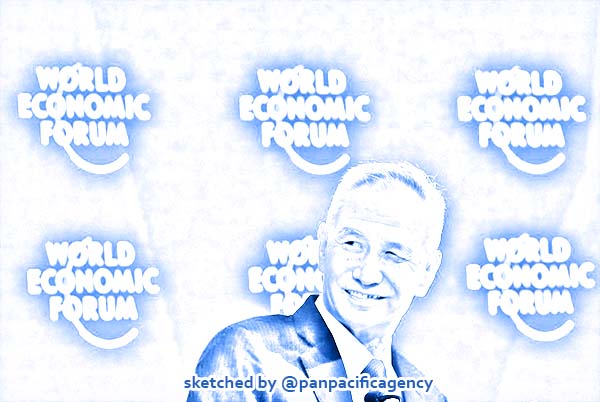[Analytics] Liu He’s the big winner by a smile

Liu He, Member of a Political Bureau of CPC Central Committee, smiles during the World Economic Forum (WEF) annual meeting in Davos, Switzerland January 24, 2018. REUTERS/Denis Balibouse. Sketched by the Pan Pacific Agency.
There was one big winner in a big week for China and the United States. A limited phase one trade deal left US President Donald Trump and Chinese counterpart Xi Jinping claiming varying degrees of success. And the credit. Gordon Watts specially for the Asia Times.
But since the mini accord was simply an hors d’oeuvre to a more sumptuous phase two main meal, kudos should go to China’s cagey trade negotiator Liu He. After all, a more expansive agreement looks to be off the menu.
Even Liu would be hard-pressed to cook that one up. But his skill and easy smile did help paper over the cracks which appeared during nearly 14 rounds of discussions with US Treasury Secretary Steven Mnuchin and US Trade Representative Robert Lighthizer.
Back in August when Trump was mulling over another salvo of tariffs, Xi’s confidante kept his cool and his cards close to his chest.
“We are willing to resolve the issue through consultations and cooperation in a calm attitude and resolutely oppose the escalation of the trade war,” the 67-year-old economist, who received a Masters in Public Administration at Harvard University, said.
Just one year older than his boss, Liu is part of Xi’s inner circle and a member of the powerful Politburo of the Communist Party of China’s Central Committee. He is also considered a “pragmatic reformer” after being published widely on the country’s economic development policy.
In 2018, he added to his résumé when delivering a keynote speech at the World Economic Forum in Davos.
“As we all know, if a bucket is to hold more water, its shortest plank must be made longer,” he told business and political leaders at the swanky Swiss resort.
“Likewise, for China to build a moderately prosperous society in all respects, we must fix the shortest plank in our development through winning these battles,” he added.
Liu’s metaphor was a reference to the decision by Xi’s government to realign the state-backed economic model to high-tech manufacturing and internet-based services. Consumption, not cheap low-value exports, would be pivotal to Beijing’s blueprint.
A slowdown in growth has been a painful side effect. Last year, the world’s second-largest economy expanded at its weakest rate in nearly three decades with GDP growth coming in at 6.1% compared to 6.6% in 2018. Projected figures of 6% have been penciled in for 2020, but that might be slightly optimistic.
“[This is the] new normal,” Louis Kuijs, the head of Asia economics at Oxford Economics, told the AFP news agency, adding that the “slowdown” would probably continue as China’s economy becomes more developed. “What they don’t want to see is a too-rapid slowdown.”
In a raft of data released by the National Bureau of Statistics on Friday, industrial production and retail sales stalled during 2019 before picking up in December ahead of next week’s Chinese New Year holiday.
Still, trade war uncertainty in the past 12 months has acted as a brake. Indeed, the figures were rolled out just days after Liu and Trump signed the phase one pact in Washington.
During a rare moment of reflection, Xi’s trusted aide reverted to a traditional Chinese proverb when discussing phase two talks.
“[We will not act] like a bear losing itself in a cornfield. We might get nothing if we rush to a second job before the first one is properly done. I don’t think it is a wise choice to impatiently launch new stages of talks,” Liu told Caixin magazine.
“Politically, the agreement is conducive to maintaining the stable and sound development of overall China-US relations, creating a good international environment, and promoting world peace and development,” he continued in a second interview with Xinhua, the official state-run news agency.
“It was for this reason that the news of China and the United States having reached the agreement received an immediate and massive welcome in both countries, the international community as well as the global financial markets,” he added with more than a hint of hype.
But Liu will need more than that to solve the phase two impasse, which strikes at the heart of Beijing’s state-run economic model.